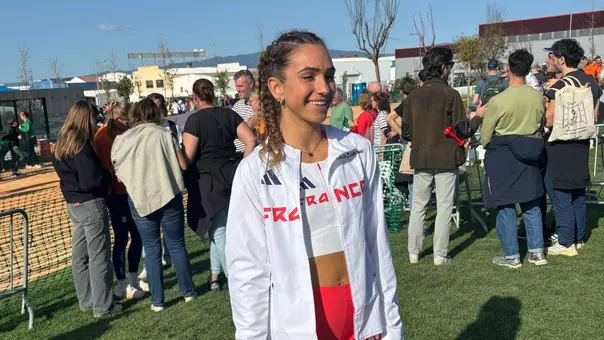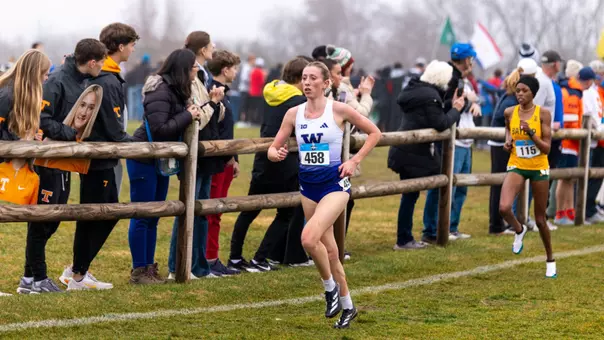
Gardner's Journey One Of Ultimate Perseverance
November 08, 2017 | Cross Country
By Rich Myhre
SEATTLE - Becoming an elite distance runner takes purpose, fortitude, confidence and resolve.
Overcoming a grievous past is very much the same.
Andrew Gardner's journey from his native Ethiopia to the University of Washington began years ago, and along the way he experienced considerable hardship and heartache. But in a story of ultimate triumph, Gardner was adopted by an American family, wrapped in love and assurance, and convinced that he could have a life of joy and fulfillment.
Since arriving in the United States more than a decade ago he has been greatly blessed, and for that "I definitely feel gratitude," said Gardner, a fifth-year senior on the UW cross country team. "Things turn out for the better.
"I've learned from a lot of the challenges that came my way," he said, "and I can look back now and say, 'If I could deal with that, I think anything is possible.'"
His memories of Ethiopia are scattered, though he remembers life in a remote village, the suffering caused by severe famine, and then the decision by his parents to take the family's two youngest children, Gardner and a younger sister, and leave them at an orphanage in Addis Ababa, Ethiopia's capital city. He was 8 years old.
"I didn't know what was happening," Gardner said. "I thought I'd be (at the orphanage) for a short time until things got better, but that wasn't the case. And I had no control of what was happening."
There was greater despair to come. Six months later his younger sister died, leaving him alone.
"At that point, all hope was lost for me," he said. "I had a hard time trying to adjust to life again."
But about that time an American couple, Michelle and Steve Gardner of Spokane, showed up at the orphanage, wanting to adopt a child. At age 9, Andrew became their son.
Still unsure of what was happening, and with no idea what to expect, he flew from Ethiopia to his new home in the United States. In every way imaginable, it was a vastly different world.
"I was shocked to realize the different way of life here," he said. "It took a while (to adjust). It was tough."
But it helped to have company. Of the 12 Gardner children, nine were adopted from overseas -- one from Russia, one from China, one from India, and the remaining six, including Andrew, from Ethiopia.
Still, memories are not like words on a blackboard -- easily wiped away. He knew he was born in another country, that he still had family there, and that his family had sent him away. Even in the comfort and safety of his new home, it was hard to forget.
"I've always had questions about why and how things happened," Gardner said of his childhood. "It's not something where you can just say, 'OK, I've got it now, I've figured it out.' … I'm still trying to differentiate who I am as a person and how to connect the whole thing together."
It has been, he admitted, "a difficult task. But I'm in a great situation now. I've got a wonderful wife (he married Heleena, his high school sweetheart, last summer) and I have great support from family members here. So on the days I do have questions and when I have too much to think about, they keep me going."
In the early years, and as he acclimated to life in his new country, Gardner developed an interest in American pastimes, particularly sports. He wanted to play football and soccer, and he had enough prowess at a young age for those to seem like reasonable choices. But by the time he got to high school it was clear that he'd never be big enough for any long-term ambitions in football. Neither was he quick enough and agile enough to have similar hopes for soccer.
But he could run. Goodness, could he run. As a younger boy it showed on the playfields, and by the time he got to Spokane's Mead High School he was running cross country and track, and making it look easy. Initially he could win without really pushing himself, but with proper training he became a star, winning five Class 4A state cross country and track titles. In his senior cross country season of 2012, he was Washington's cross country Gatorade Athlete of the Year.
All that success got the attention of UW head coach Greg Metcalf. After a recruiting visit to Spokane with associate head coach Jason Drake, the two men came away convinced that Gardner ought to be a Husky.
"As Coach Drake and I left (Gardner's) home, we said, 'We've got to have this kid.' For everything that he is and what he stands for," Metcalf recalled. "He was incredibly gifted and a fantastic competitor coming out of high school."

At Washington, Gardner has developed into one of the team's most dependable runners, both in cross country where he is nearing the end of his collegiate eligibility, and in track where he has one remaining season and perhaps two (the school is petitioning for an additional medical redshirt year, due to an abbreviated 2017 season).
In cross country in 2015, Gardner helped Washington to an eighth-place finish at the NCAA Championships, and in the ensuing track season he placed 18th in the steeplechase at the NCAA Championships, earning honorable mention All-America recognition. A year ago he was the top UW finisher at the Pacific-12 Conference cross country championships, placing 18th overall, and he later ran 33rd at the NCAA West Regionals.
Gardner improved to 11th place in the recent 2017 Pac-12 championships, second among Huskies to teammate Mahmoud Moussa, who finished fifth.
Coming up Friday are the West Regionals, scheduled for Seattle's Jefferson Park Golf Course. At stake are spots in the upcoming NCAA Championships for both teams and individuals.
"Andrew is a wonderful young man and I couldn't be more excited about what the next two races at 10,000 meters have in store for him," Metcalf said. "I think right now he's fired up to go run."
Before the season, Metcalf went on, "I think Andrew's goals and aspirations were to go be an NCAA All-American in cross country," meaning a top-40 finish at nationals. "That's hard to do, but with the trajectory Andrew is on right now you can see he's full of maturity and belief and confidence. He's rising at the right time, and I'm excited to go watch him.
"I've never been more confident in what he's doing. His training is going well, he's healthy, and this is the finished product, so it's fun to see. I think he'll roll into the next two meets on our schedule as confident as I've ever seen him."
And what are the chances the Huskies can do something special in the season's remaining meets?
"Extremely high, I think," Gardner said. "We all individually need to believe we're capable of it. Right now, we have the numbers that we need … so we just need to do a lot of believing in ourselves, and then go and execute what we've done before. Because we have a great group of guys that are capable of doing anything they set their minds to."
SEATTLE - Becoming an elite distance runner takes purpose, fortitude, confidence and resolve.
Overcoming a grievous past is very much the same.
Andrew Gardner's journey from his native Ethiopia to the University of Washington began years ago, and along the way he experienced considerable hardship and heartache. But in a story of ultimate triumph, Gardner was adopted by an American family, wrapped in love and assurance, and convinced that he could have a life of joy and fulfillment.
Since arriving in the United States more than a decade ago he has been greatly blessed, and for that "I definitely feel gratitude," said Gardner, a fifth-year senior on the UW cross country team. "Things turn out for the better.
"I've learned from a lot of the challenges that came my way," he said, "and I can look back now and say, 'If I could deal with that, I think anything is possible.'"
His memories of Ethiopia are scattered, though he remembers life in a remote village, the suffering caused by severe famine, and then the decision by his parents to take the family's two youngest children, Gardner and a younger sister, and leave them at an orphanage in Addis Ababa, Ethiopia's capital city. He was 8 years old.
"I didn't know what was happening," Gardner said. "I thought I'd be (at the orphanage) for a short time until things got better, but that wasn't the case. And I had no control of what was happening."
There was greater despair to come. Six months later his younger sister died, leaving him alone.
"At that point, all hope was lost for me," he said. "I had a hard time trying to adjust to life again."
But about that time an American couple, Michelle and Steve Gardner of Spokane, showed up at the orphanage, wanting to adopt a child. At age 9, Andrew became their son.
Still unsure of what was happening, and with no idea what to expect, he flew from Ethiopia to his new home in the United States. In every way imaginable, it was a vastly different world.
"I was shocked to realize the different way of life here," he said. "It took a while (to adjust). It was tough."
But it helped to have company. Of the 12 Gardner children, nine were adopted from overseas -- one from Russia, one from China, one from India, and the remaining six, including Andrew, from Ethiopia.
Still, memories are not like words on a blackboard -- easily wiped away. He knew he was born in another country, that he still had family there, and that his family had sent him away. Even in the comfort and safety of his new home, it was hard to forget.
"I've always had questions about why and how things happened," Gardner said of his childhood. "It's not something where you can just say, 'OK, I've got it now, I've figured it out.' … I'm still trying to differentiate who I am as a person and how to connect the whole thing together."
It has been, he admitted, "a difficult task. But I'm in a great situation now. I've got a wonderful wife (he married Heleena, his high school sweetheart, last summer) and I have great support from family members here. So on the days I do have questions and when I have too much to think about, they keep me going."
In the early years, and as he acclimated to life in his new country, Gardner developed an interest in American pastimes, particularly sports. He wanted to play football and soccer, and he had enough prowess at a young age for those to seem like reasonable choices. But by the time he got to high school it was clear that he'd never be big enough for any long-term ambitions in football. Neither was he quick enough and agile enough to have similar hopes for soccer.
But he could run. Goodness, could he run. As a younger boy it showed on the playfields, and by the time he got to Spokane's Mead High School he was running cross country and track, and making it look easy. Initially he could win without really pushing himself, but with proper training he became a star, winning five Class 4A state cross country and track titles. In his senior cross country season of 2012, he was Washington's cross country Gatorade Athlete of the Year.
All that success got the attention of UW head coach Greg Metcalf. After a recruiting visit to Spokane with associate head coach Jason Drake, the two men came away convinced that Gardner ought to be a Husky.
"As Coach Drake and I left (Gardner's) home, we said, 'We've got to have this kid.' For everything that he is and what he stands for," Metcalf recalled. "He was incredibly gifted and a fantastic competitor coming out of high school."

At Washington, Gardner has developed into one of the team's most dependable runners, both in cross country where he is nearing the end of his collegiate eligibility, and in track where he has one remaining season and perhaps two (the school is petitioning for an additional medical redshirt year, due to an abbreviated 2017 season).
In cross country in 2015, Gardner helped Washington to an eighth-place finish at the NCAA Championships, and in the ensuing track season he placed 18th in the steeplechase at the NCAA Championships, earning honorable mention All-America recognition. A year ago he was the top UW finisher at the Pacific-12 Conference cross country championships, placing 18th overall, and he later ran 33rd at the NCAA West Regionals.
Gardner improved to 11th place in the recent 2017 Pac-12 championships, second among Huskies to teammate Mahmoud Moussa, who finished fifth.
Coming up Friday are the West Regionals, scheduled for Seattle's Jefferson Park Golf Course. At stake are spots in the upcoming NCAA Championships for both teams and individuals.
"Andrew is a wonderful young man and I couldn't be more excited about what the next two races at 10,000 meters have in store for him," Metcalf said. "I think right now he's fired up to go run."
Before the season, Metcalf went on, "I think Andrew's goals and aspirations were to go be an NCAA All-American in cross country," meaning a top-40 finish at nationals. "That's hard to do, but with the trajectory Andrew is on right now you can see he's full of maturity and belief and confidence. He's rising at the right time, and I'm excited to go watch him.
"I've never been more confident in what he's doing. His training is going well, he's healthy, and this is the finished product, so it's fun to see. I think he'll roll into the next two meets on our schedule as confident as I've ever seen him."
And what are the chances the Huskies can do something special in the season's remaining meets?
"Extremely high, I think," Gardner said. "We all individually need to believe we're capable of it. Right now, we have the numbers that we need … so we just need to do a lot of believing in ourselves, and then go and execute what we've done before. Because we have a great group of guys that are capable of doing anything they set their minds to."
Players Mentioned
Anna Gibson | Former UW Track Student-Athlete Debuts Ski Mountaineering at the Winter Olympics
Saturday, February 21
Raising the Bar | Hana & Amanda Moll
Monday, August 04
Women's 1500m final - 2025 NCAA outdoor track and field championship
Sunday, June 15
Nathan Green | 2025 NCAA 1500m Champion
Saturday, June 14













